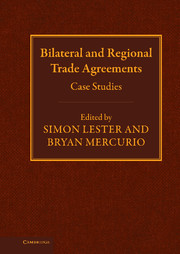Book contents
- Frontmatter
- Contents
- List of Tables
- Notes on Contributors
- Acknowledgements
- Table of Abbreviations
- Table of Cases
- Table of Treaties and International Agreements
- Introduction
- 1 Australia–United States Free Trade Agreement
- 2 Central American–Dominican Republic–United States Free Trade Agreement
- 3 Chile–China Free Trade Agreement
- 4 European Union–Mexico Economic Partnership, Political Coordination and Cooperation Agreement
- 5 European Free Trade Association–Southern African Customs Union Free Trade Agreement
- 6 Japan–Mexico Economic Partnership Agreement
- 7 United States–Morocco Free Trade Agreement
- 8 Association of Southeast Asian Nations–China Free Trade Agreement
- Index
- References
5 - European Free Trade Association–Southern African Customs Union Free Trade Agreement
Published online by Cambridge University Press: 16 December 2009
- Frontmatter
- Contents
- List of Tables
- Notes on Contributors
- Acknowledgements
- Table of Abbreviations
- Table of Cases
- Table of Treaties and International Agreements
- Introduction
- 1 Australia–United States Free Trade Agreement
- 2 Central American–Dominican Republic–United States Free Trade Agreement
- 3 Chile–China Free Trade Agreement
- 4 European Union–Mexico Economic Partnership, Political Coordination and Cooperation Agreement
- 5 European Free Trade Association–Southern African Customs Union Free Trade Agreement
- 6 Japan–Mexico Economic Partnership Agreement
- 7 United States–Morocco Free Trade Agreement
- 8 Association of Southeast Asian Nations–China Free Trade Agreement
- Index
- References
Summary
Introduction
The Free Trade Agreement (FTA) negotiations between the European Free Trade Association (EFTA) (comprising Iceland, Liechtenstein, Norway and Switzerland) and the Southern African Customs Union (SACU) (comprising South Africa, Botswana, Lesotho, Namibia and Swaziland) were launched in May 2003 and successfully concluded in August 2005 after seven negotiating rounds. By 7 August 2006, all countries had signed the agreement, which enters into force on the first day of the second month following the date on which the last Party has deposited its instrument of ratification, acceptance or approval or notified provisional application.
SACU and EFTA are significant trading partners. In 2005, the EFTA States exported goods worth US$609 million to the SACU States and imported goods worth US$1.3 billion from the SACU States. South Africa, in particular, has always enjoyed very good relations with both Switzerland and Norway and those relationships made it relatively easy for the parties to initiate and successfully conclude FTA negotiations. This agreement is therefore expected to enhance trade flows between EFTA States and their SACU counterparts and provide additional incentives for foreign direct investments with the net effect of boosting economic growth and development.
Based on official documents, press releases, face-to-face interviews with some key players and questionnaire responses, this chapter seeks to give an overview of the EFTA–SACU FTA.
- Type
- Chapter
- Information
- Bilateral and Regional Trade AgreementsCase Studies, pp. 97 - 110Publisher: Cambridge University PressPrint publication year: 2009
References
- 2
- Cited by



